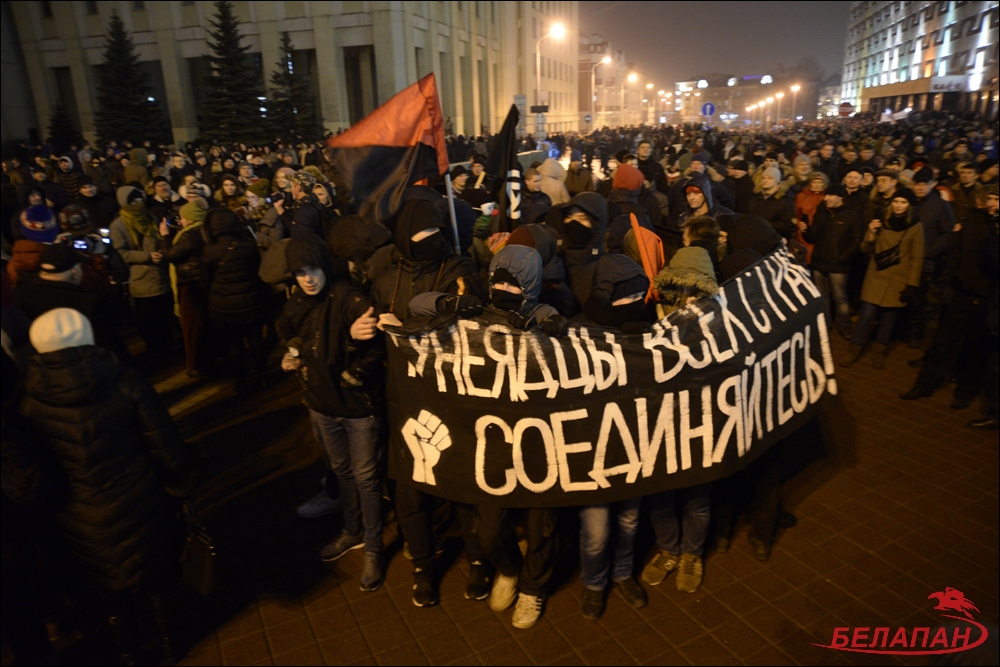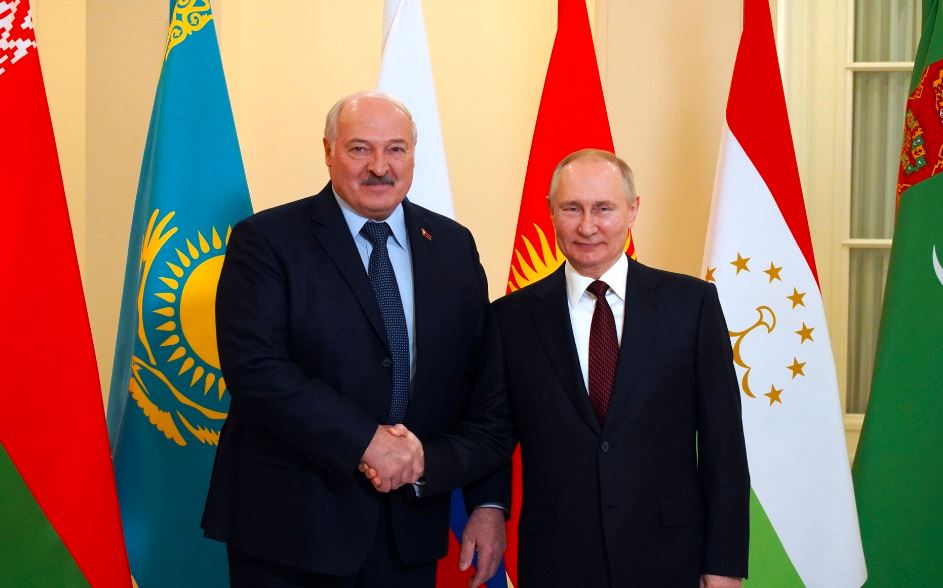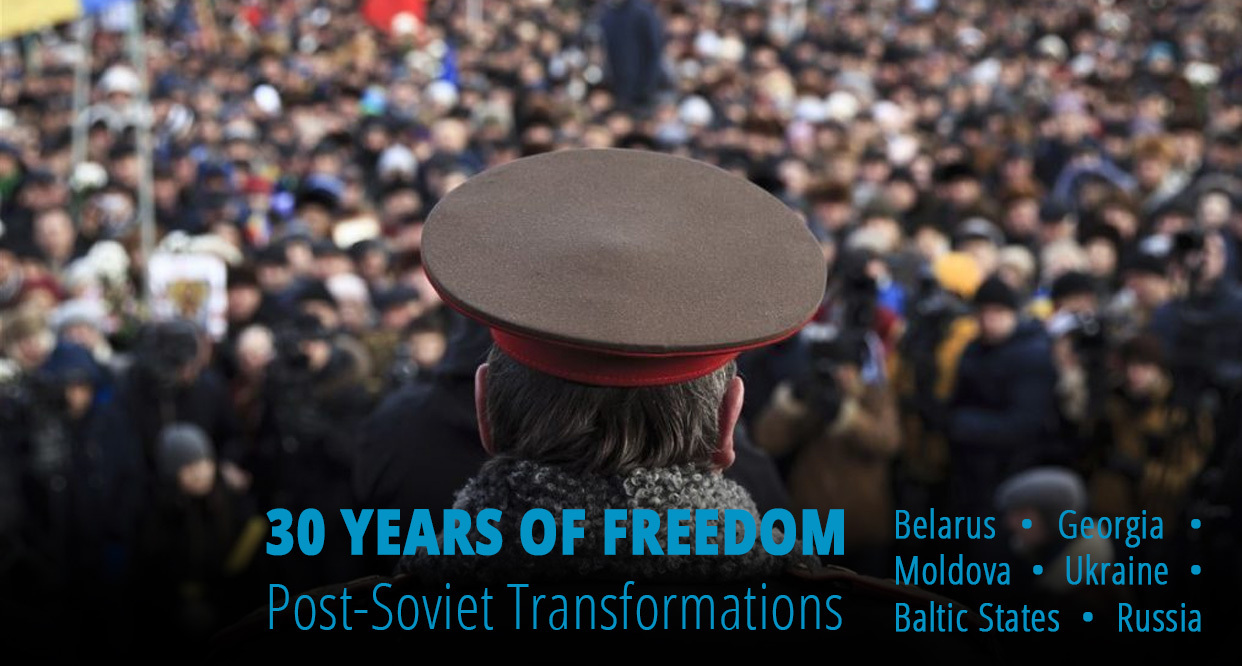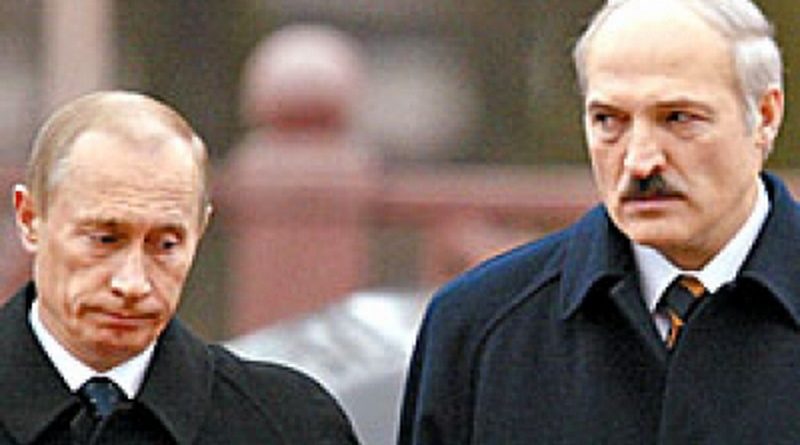All opposition leaders jailed or expelled
If self-proclaimed president-elect Alyaksandr Lukashenka thought he would defuse the protests shaking Belarus for the 38th day in a row by crippling the opposition leaders, he was wrong.
It was predictable: three days after the falsified elections on 9 August, where Lukashenka claimed an improbable landslide victory, his lapdogs hounded and threatened Sviatlana Tsikhanouskaya, the probable winner of that falsified plebiscite, into leaving the country, but this didn’t deter the protesters. They kept taking to the streets all over the country in hundreds of thousands, disregarding police arrests and harrowing stories of brutality in detention centers, despite their formal leader being outside the country.
Having recovered from her forced flight, on 14 August Tsikhanouskaya called to set up a Coordination Council to facilitate the peaceful transfer of power from the dictator.
One month later, Lukashenka succeeded in jailing or expelling the Presidium of this Council.
He did not succeed in quelling the protests.
His last week’s stunt with kidnapping Maria Kalesnikava, the last woman from the iconic trio that shook his reign these presidential elections made international headlines, not in the last because the bold opposition leader tore up her passport on the Ukrainian border and escaped out the rear car window to evade forced deportation.
We know about this because her associates Anton Radniankov and Ivan Krautsov did not escape that fate and told of the Belarusian siloviki’s operation at a press conference in Kyiv.
Kidnapped Belarus opposition leader tore up passport to resist deportation to Ukraine
In a complaint lodged with Belarus’ Investigative Committee, Kalesnikava has since provided more details about her abduction:
“They threatened me with death, and I perceived those threats as genuine. For example, they said that if I don’t leave Belarus willingly, I’ll still be moved out, in one piece or several. They threatened to put me in prison for 25 years, to ’cause problems’ for me at the detention center and prison, and these I also perceived as genuine threats. I didn’t agree to their demands, so they put me in a cell for an hour.
The people I mentioned have made genuine threats against my life and health. During my illegal detention at the Organized Crime and Corruption Unit and KGB, I used every opportunity to tell the nearby agents that I’ve been kidnapped and demanded to let my location be known to my lawyer and my father.
After the KGB agents understood that I won’t leave Belarus willingly, they put a bag on my head, shoved me in a van, and took me to the border with Ukraine where they tried to force me to leave the country.
After I tore my passport to pieces, thus eliminating a possibility of entering Ukraine, I’ve been put into a van again and taken to the base of Mozyr border guard detachment, where I’ve been held until the evening of September 8.”

At the time of the kidnapping, only two out of the seven Presidium members were free: lawyer Maxim Znak (however, he was snatched off the street the next day), and the Nobel laureate Svetlana Alexievich, who was safeguarded from a visitation of Lukashenka’s siloviki by a thoughtful international coalition of ambassadors hanging out at her apartment.
LT ambassador in #Belarus A. Pulokas, alongside w/other EU ambassadors, is currently visiting the Nobel prize laureate S. Alexievich in her apartment to protect her from possible detention. She is the last member of the BY Coord. Council who has not been detained/forced to leave. pic.twitter.com/W7fKW2xDBd
— Lithuania MFA | #StandWithUkraine (@LithuaniaMFA) September 9, 2020
Pavel Latushko, the former Minister of Culture and former diplomat, left the country citing KGB pressure. Lawyer Liliya Vlasova was jailed; so was Siarhei Dylevsky, a representative of the seminal Minsk tractor works. Belarusian Christian Democracy party co-chair and Tsikhanouskaya’s trustee Volha Kovalkova was jailed but then forcefully deported by the siloviki to Poland.
As Alexievich does not actively participate in the work of the presidium for health reasons, this leaves the 51 member-strong Coordination Council officially beheaded. Tsikhanouskaya, who continues advocating for the Belarusian cause beyond the country, has suggested more Presidium members be elected.
Women’s March, 12 September
If Lukashenka’s calculation was to injure the protest movement, it failed, The Presidium played no role in organizing the muli-hundred-thousand rallies that show no sign of subsiding for the sixth weekend in a row.
This Saturday, 12 September, saw the third Women’s March take place in Minsk, with around 10,000 participants.
Women's March in Minsk. Fourth week in a row. Women are invincible.
Photos: @nashaniva pic.twitter.com/zjaSDo9dfn— Franak Viačorka (@franakviacorka) September 12, 2020
This march was different from the first one, when the women marched pretty much freely: the riot police attempted to disperse the protest, detained 46 participants, and even wrestled with the legendary Nina Baginskaya, the grandmother who became an icon of the protest movement:
Unstoppable Nina Bahinskaya (74) withstands five officers and plainclothes.
Photo: @uladek pic.twitter.com/lqMrwLihLo
— Franak Viačorka (@franakviacorka) September 12, 2020







March of Heroes, 13 September
The next day, Sunday, had all the trademarks of all post-election Sundays in the Belarusian capital, Minsk: blocked streets, fences and barbed wire in the center of the city, military equipment, water cannons, cars for dispersing crowds, paddy wagons and minivans without license plates, uniformed and plainclothed riot police, but always with covered faces, closed metro stations and shopping malls, no mobile internet. However, some things were different: anti-Lukashenka Telegram channels announced that the route would finish in Drazdy, the region where Lukashenka and other top officials live.

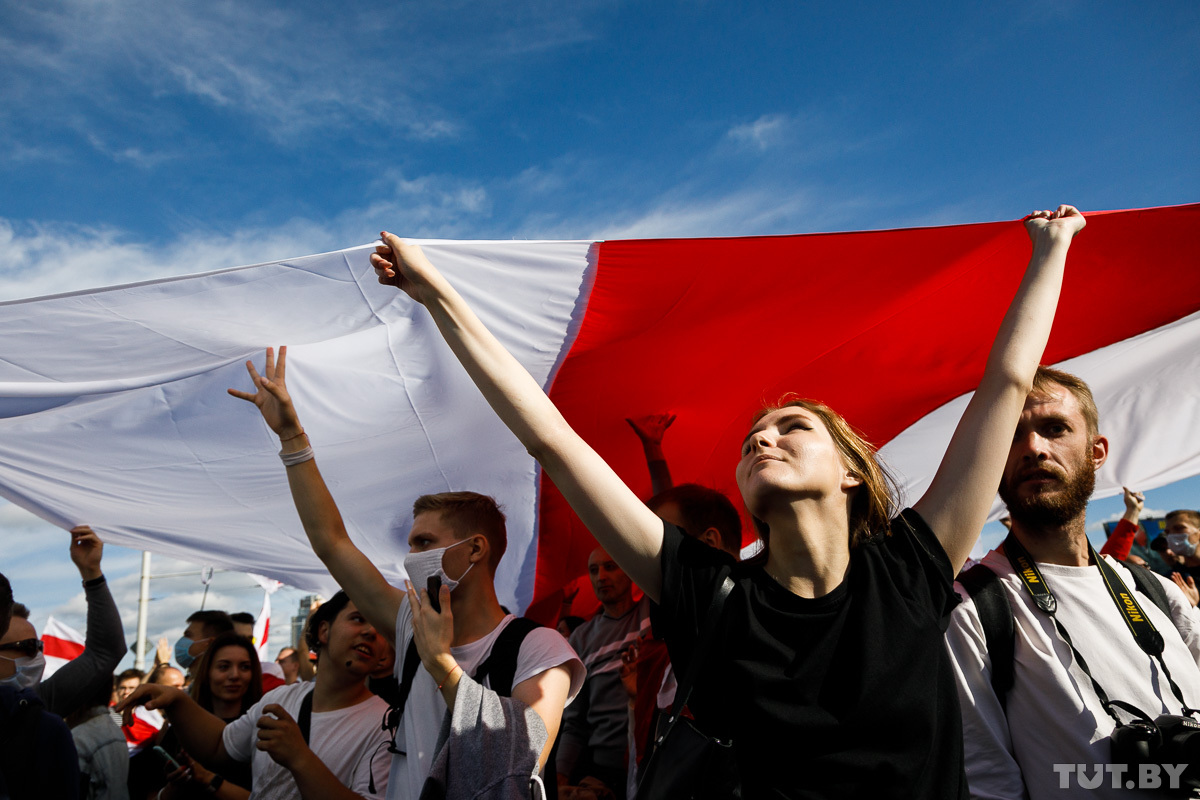





Our foe will fall – he will run away like a coward
And if he won’t – we’ll dump some pills in the old man’s tea
As they say, long live Belarus!”
Photo: Vadim Zamirovskyi, tut.by
Despite blocked streets and arrests, a portion of the protesters did manage to approach Drozdy:
Riot police cordoned the road to Drazdy. Nearby — houses of high-level officials and Lukashenka himself. Protesters stopped. They are chanting ”Tribunal” and ”Long Live Belarus!” there are multiple anti-Kremlin and pro-independence slogans and posters today. pic.twitter.com/AAKW8bYw8j
— Franak Viačorka (@franakviacorka) September 13, 2020

Protesters were detained and brutally dispersed, but this time this was done not only by uniformed riot police, but plainclothed men wielding weapons.
These groups of plainclothes with guns look horrific. They fired into the air. It looks like a terror state. pic.twitter.com/1xHPBrbgU7
— Franak Viačorka (@franakviacorka) September 13, 2020
Over 500 were detained in Minsk, according to the police.
Arbitrary arrests in Minsk. Police brutally detain men and women. They don’t want protesters to gather at one place. pic.twitter.com/1vl21dDaoj
— Franak Viačorka (@franakviacorka) September 13, 2020


Please, retweet. Watch how riot police were detaining peaceful protesters in Minsk today. I am wondering if the EU/US will be brave enough to impose individual sanctions against all those involved in the violent crackdown on non-violent protesters in Belarus. pic.twitter.com/KDIMDbyFHe
— Franak Viačorka (@franakviacorka) September 13, 2020
Similar protests were held on Sunday in at least 12 other Belarusian cities.
Read also:
- Lukashenka’s riot police powerless against 10,000-strong women’s march | Photos
- Belarusian journalists on strike replaced by Russia’s RT strike-breakers
- Meet the 75-year-old granny who became an icon of the protests against Lukashenka
- How Alyaksandr Lukashenka stole the Belarus presidential election





